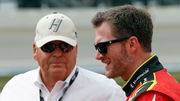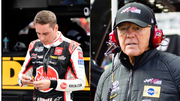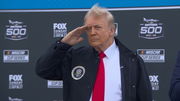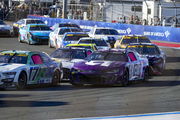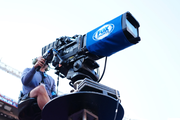
via Imago
Kyle Larson and Tony Stewart | Image Credits: Imago

via Imago
Kyle Larson and Tony Stewart | Image Credits: Imago
The world of motorsports can never forget the horrifying incident that happened in Daytona back in 2001. The final lap tragedy resulted in the demise of one of the biggest legends of the sport and raised the burning question of safety. After making contact with Ken Schrader and Sterling Marlin, a basilar skull fracture claimed the life of veteran driver Dale Earnhardt instantly as he crashed into a retaining wall. Two decades have passed since; yet, the echoes of unsafe territory that NASCAR drivers often find themselves in are still abuzz in varying degrees.
This year’s race at the Talladega Superspeedway seems to have brought back the harrowing nightmare from 2001. Hendrick Motorsports speedster Kyle Larson was T-boned by Stewart-Haas Racing’s Ryan Preece at 130 mph. Thankfully, the point of contact was at the passenger side of the car. However, it could just as easily have been at the driver’s side. Driver safety is paramount, and it seems, there is finally an affirmative answer to it.
ADVERTISEMENT
Article continues below this ad
NASCAR reveals the new developments regarding the safety of the Next Gen cars after the Kyle Larson incident
The inception of the Larson incident can be traced to the overtime restart. With just two laps to go, #42 Noah Gragson and #12 Ryan Blaney were leading the pack. Ross Chastain tried to enter the center but eventually made contact with the #42 Chevy. This started a domino effect. As Gragson spun to the outside wall, he made contact with Kyle Larson, who spun toward the inside before drifting back into the track and becoming a sitting duck for the oncoming traffic.
In the commotion that followed, Ryan Preece couldn’t zig-zag through and crashed perpendicularly into the #5 Chevy. He hit the passenger side of the car and the impact led to the support beams of the cars getting twisted or broken. The #5 car was mangled and was beyond repair, while Ryan Preece’s Ford also sustained severe damages in the front end.
Contact from Ross Chastain sends Noah Gragson around! pic.twitter.com/Z9UvFZYWqQ
— FOX: NASCAR (@NASCARONFOX) April 23, 2023
Nevertheless, both the cars were sent to the R&D Centre of NASCAR for further evaluation and whether there was any scope for development in the safety developments of the car. And it seems there finally is, as NASCAR posted a video of it on Twitter.
In the steps toward development, Dr. John Patalak of NASCAR gave a detailed overview of the new design. He revealed, “So we took the cars apart, slowly started from the outside working our way in to see what effect does the crash had on the chassis, how they performed. And we also have a lot of data that comes out of our cars, we have crash data, we have GPS and telemetry data. And we looked all of that to reconstruct, to come up with the offset, the speed the angle so that we could learn more and test solutions for improvements.”
The right sidebars which had received the highest impact now have additional steel plates along with the removal of the V-brace from the front clip of the car. It also now includes an empty ballast box and modified cross-brace.
Watch This Story: A Video of Denny Hamlin Confronting A Bitter Chase Elliott Resurface s after the Coca-Cola 600 drama
Trending
ADVERTISEMENT
Article continues below this ad
The governing body gives a detailed description and the developments of the car
NASCAR disclosed further improvements that were introduced in the cars. Dr. Patalak stated, “We’ve taken a lot of the steel structural members and removed material from key elements to make this structure less stiff. We have slots on both sides, we have deleted some cross members between the upright mounts and we’ve treated some of the areas down low that are some of the first to contact the wall on the front clip.” Slots were added to the ballast container to better the amount of displacement and undo the accelerations that the driver may be facing.
Dr. John Patalak, vice president of safety engineering at NASCAR, explains more about these updates. https://t.co/rdamLf3a5f
— NASCAR (@NASCAR) June 8, 2023
ADVERTISEMENT
Article continues below this ad
He then added, “So, you have one clip and it’s got to live at Bristol and Dover and curb jumping at road courses and the wheel-to-wheel contact that happens every weekend. NASCAR and Dallara needed to make sure that the structure of the car was strong enough to not bend during all of those things.” With so much to look forward to, these newly developed Next Gen cars are set to roll out in Atlanta and will seen be put to test.
Read More: Bubba Wallace Sends NASCAR Fans Into a Frenzy With His “Nothing Comes Close” Statement
ADVERTISEMENT
ADVERTISEMENT
ADVERTISEMENT
ADVERTISEMENT


